Ever confused mineral spirits with denatured alcohol? Dive in as we dissect their peculiarities and guide you to make informed choices!
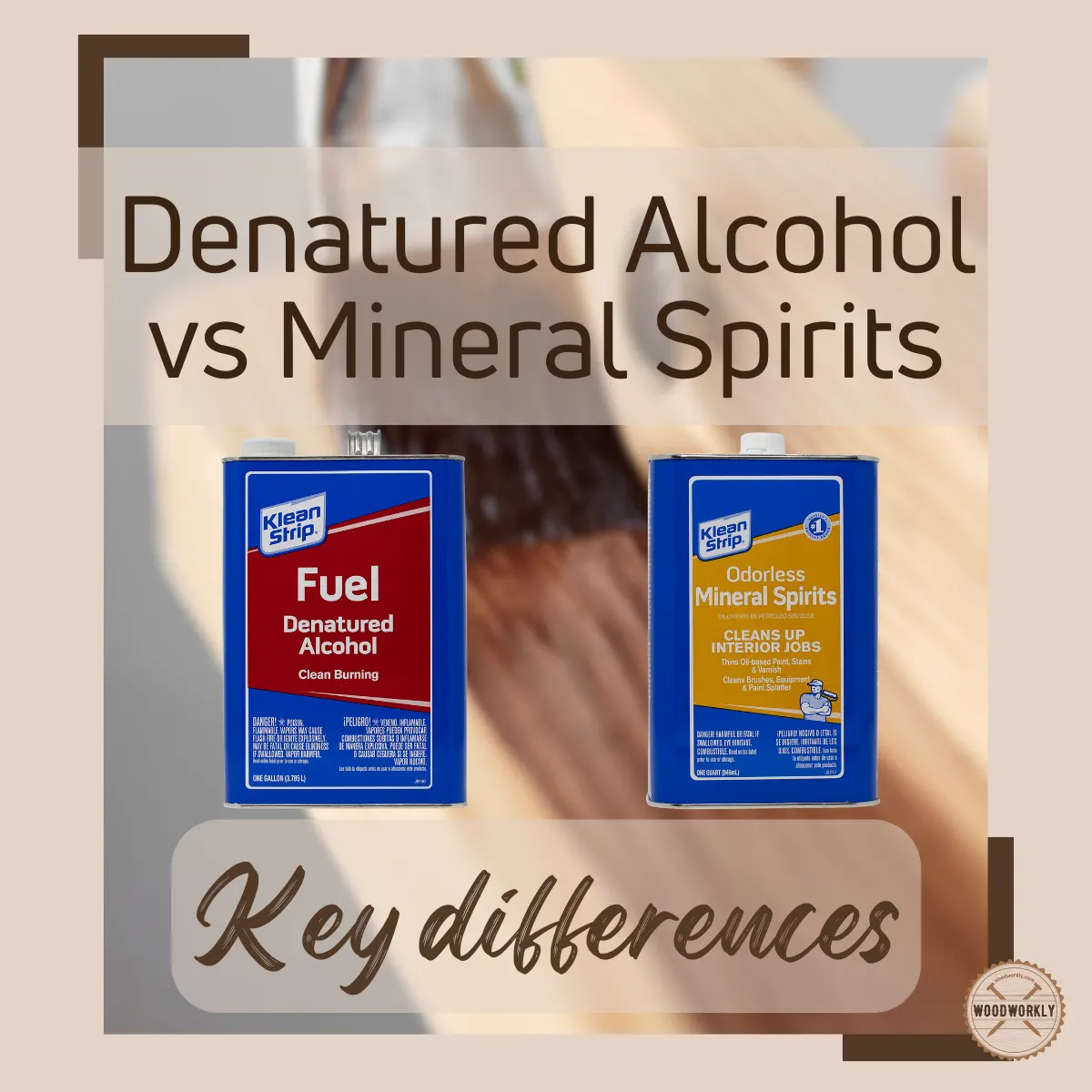
Ever since I entered this field, I have used various types of solvents including denatured alcohol and mineral spirits, but I wanted to select the best type of solution.
To do this, I began seeking out information and consulted my friends. As a result of my research, I was able to identify lots of differences between denatured alcohol and mineral spirits.
This helped me to figure out which one is better.
Here are the main differences between denatured alcohol and mineral spirits,
- Drying Time: Denatured alcohol dries quickly whereas mineral spirits dry slowly.
- Residual: Mineral spirits leave an oily residue; denatured alcohol evaporates without leaving a residue.
- Wood Cleaning: Denatured alcohol is used for cleaning unfinished wood, while mineral spirits are used for cleaning finished wood.
- Compatibility with Water: Denatured alcohol is miscible with water, whereas mineral spirits are not.
- Incendiary: Both are flammable, requiring precautions during disposal.
- Effect on Finished Wood: Denatured alcohol can dissolve wood finishes, while mineral spirits do not affect hardened or cured wood finishes.
- Colors: Denatured alcohol might be colored (usually violet or blue) while mineral spirits are clear.
- Raw Materials: Denatured alcohol is plant-derived (ethanol-based), while mineral spirits are petroleum-derived.
- Wood Finish: Denatured alcohol affects different wood finishes differently (like removing shellac finish), whereas mineral spirits do not dissolve cured finishes.
- Mixability: Denatured alcohol is water-miscible, in contrast to mineral spirits which are not miscible with water.
But there’s a lot more to know about each of those differences.

In this article, I’ll explore denatured alcohol and mineral spirits separately and then compare both of them by making a denatured alcohol vs mineral spirits comparison to select the one that is useful the most.
Furthermore, I’ll answer some frequently asked questions as well.
So, let’s jump in!
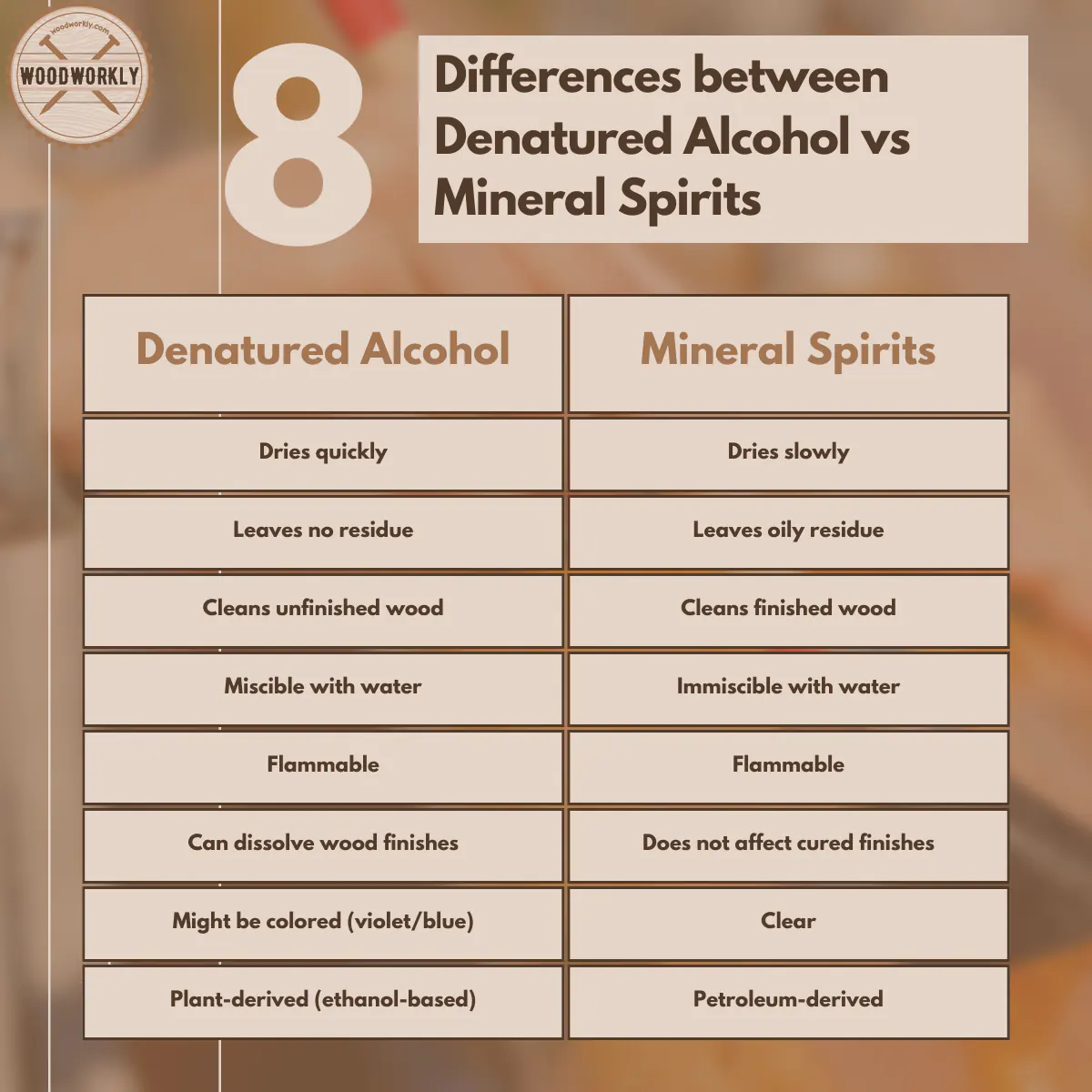
What is Denatured Alcohol?
Denatured alcohol is a clear-colored liquid used in various household commercial and woodworking applications. It is the main ingredient in shellac, a popular wood finish.
Denatured alcohol is also known as methylated spirits. Ethanol is formed by combining certain additives and dye compounds.
Additives and dyes make alcohol toxic, bad taste, and bad smell, and are visually unpleasant.
Denatured alcohol is a water-soluble solvent made from ethanol.
Denatured alcohol is often used to remove sticky materials such as tape residue, glue, and thick layers of grease from foods such as automotive parts.
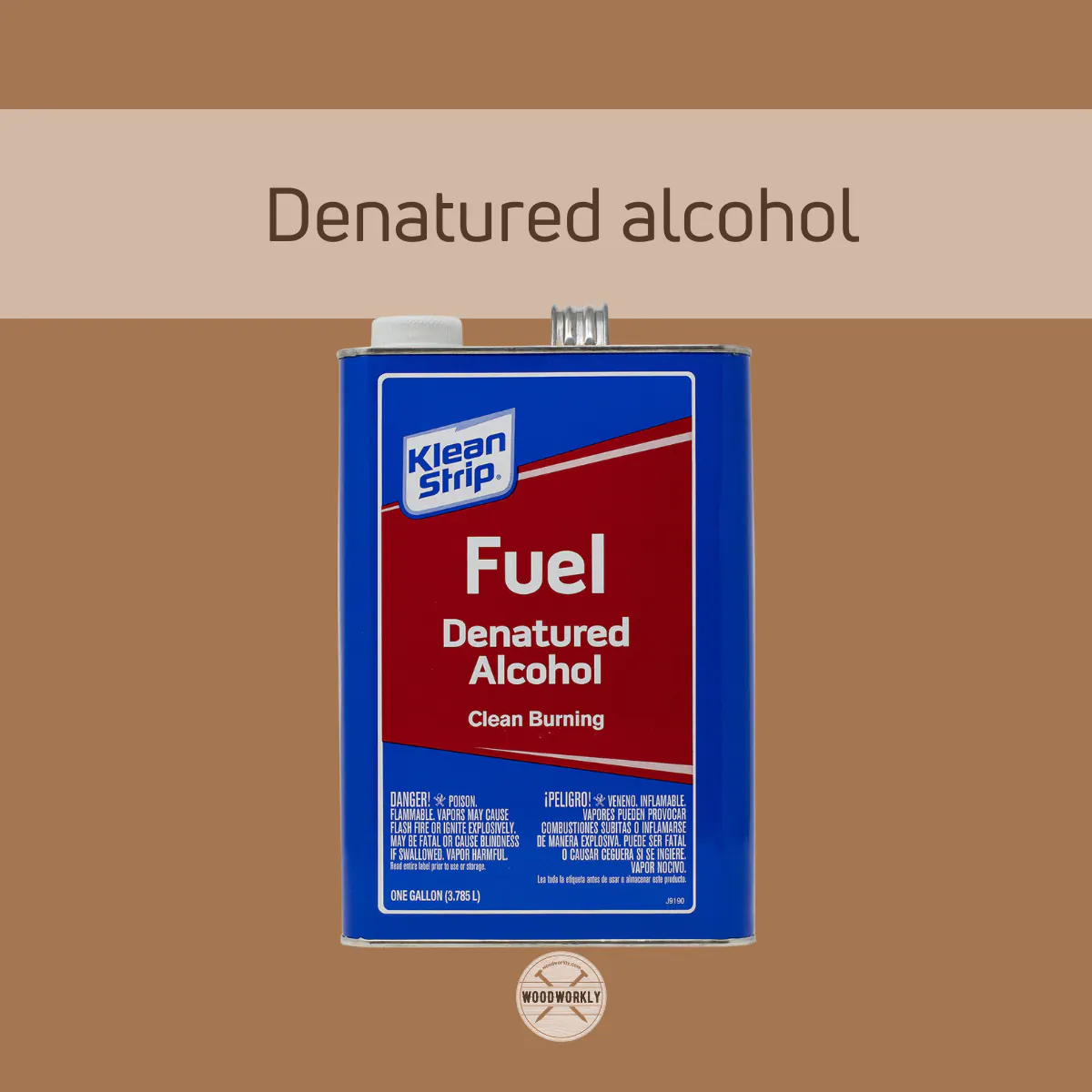
Advantages and Disadvantages of Denatured Alcohol
My experience with Denatured Alcohol and the experiences of other experts have outlined the pros and cons here.
Advantages of Denatured Alcohol
- Denatured alcohol is a strong solvent and dissolves well in water.
- Denatured alcohol is cheaper because it does not include taxes.
- Denatured alcohol has anti-bacterial properties which enable it to remove micro-organisms, so this solvent is suitable for cleaning tasks.
- This has the potential to increase drying speed and reduce processing time.
- Denatured alcohol does not corrode metals.
- Can be used as fuel for camp stoves and lamps.
Disadvantages of Denatured Alcohol
- Due to the chemicals present in it, denatured alcohol is unfit for human consumption.
- Denatured alcohol is volatile and can easily catch fire.
- The toxic fumes from this can cause headaches, eye problems, and respiratory problems.
Now you have a good understanding of denatured alcohol and its pros and cons.

How To Use Denatured Alcohol?
Now let’s find out how to use denatured alcohol.
Here are the steps you need to follow when using denatured alcohol,
- Use in clean and well-ventilated areas to avoid hazardous conditions.
- Pour a very small amount to test the surface.
- Wait for a few minutes to get your desired result.
- Use a clean lint-free cloth to wipe around the affected area.
- Finally, leave it for a few minutes to dry.
You can easily use denatured alcohol by following these steps.

Alternatives for Denatured Alcohol
In some cases, it is not possible to find this solvent. Then another option should be selected.
There are several options that can be selected for this.
Ethanol
We have discussed alcohol above, which is a combination of ethanol and other additives.
Ethanol is a perfectly good substitute for denatured alcohol as it is practically the only thing that can be found and used easily.
99% Isopropyl Alcohol
Isopropyl alcohol is also suitable if denatured alcohol or other forms of ethanol cannot be found. Make sure your isopropyl alcohol is 99%.
Less effective IPA (alcohol) due to its high water content.
High-Proof Grain Alcohol
Although generally more expensive than ethanol or isopropyl alcohol, high-proof grain alcohol is a suitable substitute for denatured alcohol.
For example, you can find 189-proof and 190-proof bottles of Ever Clear, which are very close to denatured alcohol in terms of alcohol content.
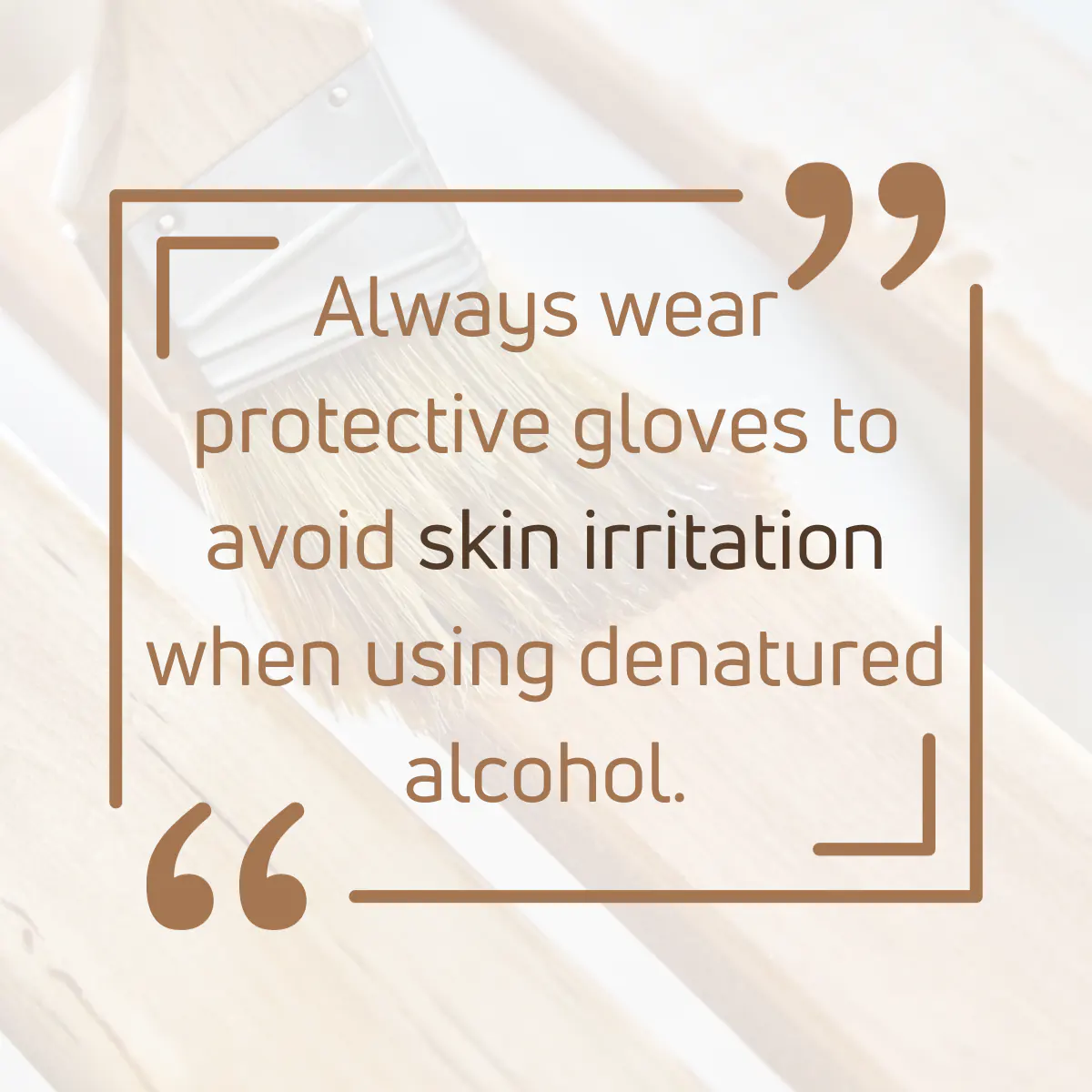
What are Mineral Spirits?
Mineral spirits, also known as white spirits, mineral turpentine, or petroleum spirits, are made from petroleum, a fossil fuel.
It is refined to make other products such as gasoline, kerosene, and mineral spirits.
Mineral spirits can be used as fuel instead of kerosene, but they are not sold because they are not in very good condition.
Can be used to clean furniture or any wooden object without damaging the finish.
Some people apply mineral spirits to the wood finish to give it a new look.
If there are natural or synthetic adhesives on the wood surface, they can be removed with mineral spirits.
Check out Does Mineral Spirits Go Bad? 5 Signs to Watch Out For!

Types Of Mineral Spirits
There are three main types of mineral spirits as well as three different grades.
Each type is divided into three different grades based on the type of crude oil used to make the product. Low flash grade, normal grade, and high flash grade.
The three main types of mineral spirits are:
Type 0
This type of mineral spirits has no further treatment after distillation. It’s basically just mineral spirits with nothing added.
Stoddard Solvent
This is a mixture of hydrocarbons. It was invented by a dry cleaner in 1924 as a less flammable alternative to the petroleum solvents commonly used at the time.
Dry cleaners began using this solvent shortly after its discovery, and it was the dominant dry-cleaning solvent until the late 1950s.
Turpentine Substitute
A turpentine substitute is commonly used for cleaning. However, it cannot be used to thin the paint because it will not dry or dry the paint forever.
It can be used to clean brushes, although it may leave behind an oily residue.

Advantages and Disadvantages of Mineral Spirits
My experience with Mineral Spirits, along with the experiences of other experts, has outlined the pros and cons here.
Advantages of Mineral Spirits
- Mineral spirits are generally less toxic than other similar solvents.
- Mineral spirits are less volatile organic compounds (VOCs), so they are free of strong odors and easier to handle. Mineral spirits are also available in unscented varieties, which are more suitable for people with heightened smell sensitivity.
- Mineral spirits are very effective at removing paint stains and even paint spills can be easily removed.
- Mineral spirits dry to a smoother and better finish.
Disadvantages of Mineral Spirits
- The solution is flammable.
- Mineral spirits can cause skin infections.
- Long-term exposure to mineral spirits can cause brain damage.
Now you have a good understanding of Mineral Spirits and its pros and cons.
Find out, Do Mineral Spirits Evaporate? Here’s The Truth!
How To Use Mineral Spirits?
Using mineral spirits is super easy and I’ve personally used them for many of my woodworking projects.
Here are the steps you need to follow when using mineral spirits,
- Use in clean and well-ventilated areas to avoid hazardous conditions.
- Pour a very small amount to test the surface.
- Wait for a few minutes to get your desired result.
- Use a clean lint-free cloth to wipe around the affected area.
- Finally, leave it for a few minutes to dry.
Read to know How To Use Mineral Spirits On Wood? (8 EASY Methods!)
You can easily use denatured alcohol by following these steps.

Alternatives for Mineral Spirits
In some cases, it is not possible to find mineral spirits and that’s where we are eager to find an alternative one.
Let’s see what solvents you can replace for the position of mineral spirits.
Turpentine
Compared to mineral spirits, turpentine has less odor and less stickiness.
Turpentine can be used as a direct substitute for mineral spirits in all areas.
Acetone
Acetone can be used as a substitute for mineral spirits.
Care must be taken when handling acetone as direct contact can damage wood.
Read to know, How to Get Acetone Off Wood? (EASY Guide!)

Differences Between Denatured Alcohol and Mineral Spirits
Now you have a good understanding of these two solutions.
So, let’s discuss the differences between denatured alcohol and mineral spirits in detail based on my own experience and as per the experts in the industry.
Just keep reading!
1. Drying time
Denatured alcohol dries very quickly and is used as a cleaning agent to remove glue and other sticky substances from metal surfaces because it dries quickly.
Mineral spirits can take several minutes to an hour to evaporate and dry. The more mineral spirits are used, the longer they take to evaporate and the longer they take to dry.
Denatured alcohol always dries faster than mineral spirits.
Drying time is important, but it shouldn’t be the only reason you choose a product. The product should be selected considering drying speed and other factors.
2. Residual
The main difference between DA and mineral spirits is that mineral spirits leave some sort of oily residue.
This can be removed using the methods you normally use to remove oily residue, such as soap.
DA leaves no balance. It is not oil-based and therefore does not leave any oil behind when the residue evaporates or cleans off.
Denatured alcohol is used to clean glass because denatured alcohol evaporates completely leaving nothing on the surface.
3. Wood Cleaning
Denatured alcohol is a versatile substance that can be used as a solvent, cleaning agent, fuel additive, or destruction aid. Fires quickly.
Mineral oil-based mineral solvents are frequently used as paint thinners. They are also used in cleaning and degreasing machines.
Denatured alcohol is commonly used to clean unfinished wood after sanding. Because it dries quickly, it does an excellent job of cleaning and removing dust without getting the surface wet.
Mineral spirits are an excellent cleaning agent for finished wood.
They won’t affect hardened or cured wood finishes, making them ideal for cleaning dirt, glue, and other sticky residue from surfaces.
When used on finished wood, mineral spirits tend to restore and revive the luster of the wood finish.

4. Compatibility with Water
The component liquids used in denatured alcohol are usually mixed with water.
These include ethanol, methanol, n-propyl alcohol, t-butyl alcohol, and isopropyl alcohol, which make the solvent water soluble.
You can use denatured alcohol by adding water for various household purposes and DIY woodworking projects.
Petroleum is an oil, so it does not mix with water. Therefore, spirits are not suitable for use to adjust the viscosity of water-based polyurethanes, varnishes, or paints.
5. Incendiary
Both denatured alcohol and mineral spirits are highly flammable substances. Use away from flammable materials.
Proper disposal precautions should be taken during disposal.
6. Effect on Finished Wood
When you apply enough denatured alcohol to the surface of the finished wood long enough, the solution can dissolve the finish and remove it completely.
Mineral spirits will not dissolve hardwood finishes, so you can safely use them on finished wood without damaging the protective barrier.
7. Colors
Mineral spirits are clear liquids, as is reduced alcohol, which is often colored violet or blue for tax reasons to indicate that it is unfit for human consumption.
8. Raw materials
The biggest difference between mineral spirits and alcohol is their composition.
Denatured alcohol is made from ethanol derived from plants, while mineral spirits are made from petroleum, a type of underground fuel.
It is refined to make other products such as gasoline, kerosene, and mineral spirits.
9. Wood finish
Mineral spirits will not dissolve cured finishes such as polyurethane, lacquer, varnish, and shellac.
Denatured alcohol solution and will completely remove the shellac finish.
Additionally, denatured alcohol can soften the lacquer finish, and it can darken the polyurethane finish.
Before deciding which product to use, you need to determine the finish you want and choose the right product for it, otherwise, you won’t get the finish you want.
10. Mixability
Another factor that can determine the solvent you should use is whether it is miscible with water.
Mineral spirits are immiscible with water while denatured alcohol is miscible with water.
While this may not be as important in woodworking, it should be considered when using it around the house.
Congrats folks! Now you know all about denatured alcohol vs mineral spirits in detail to select which one suits you the most.
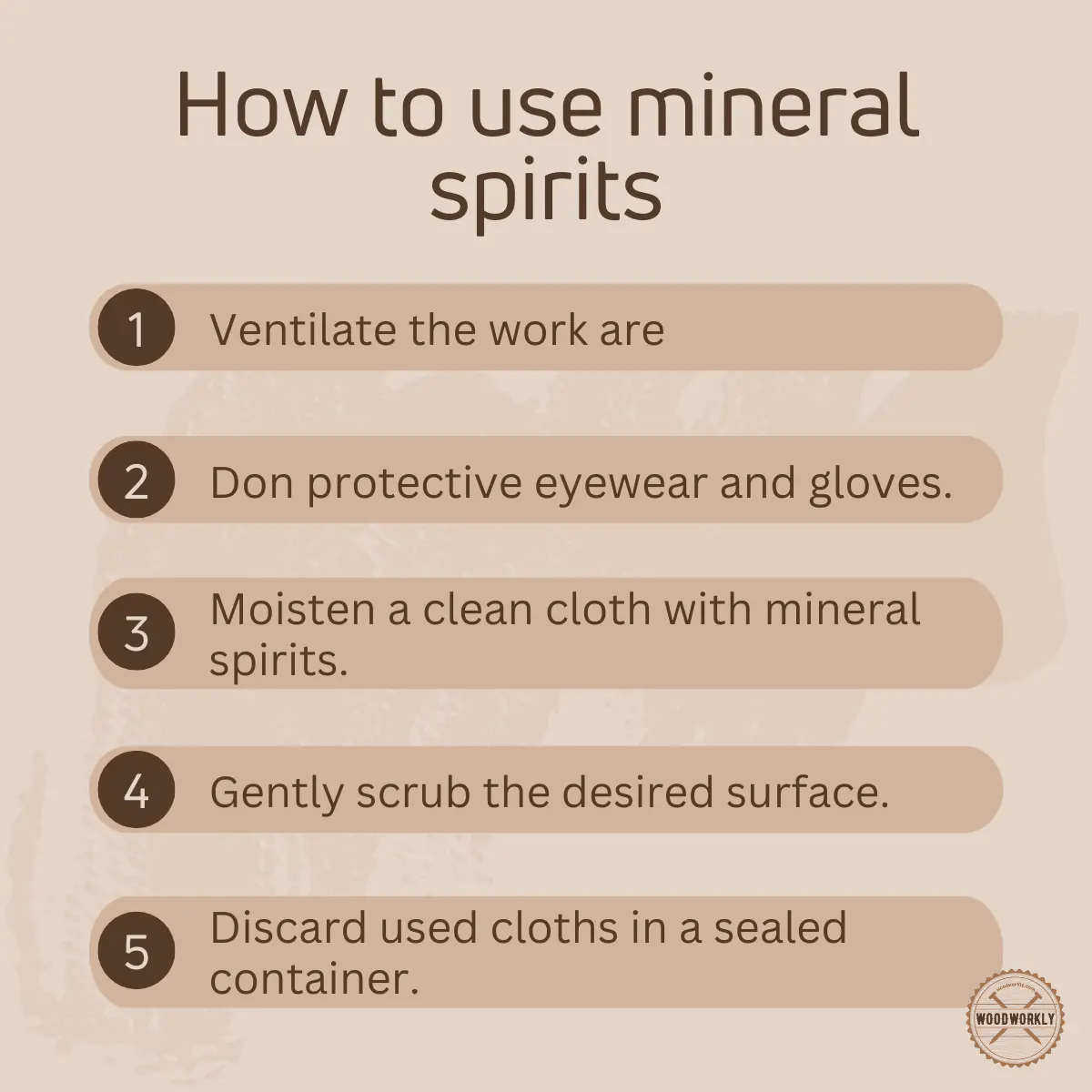
So, let’s answer some frequently asked questions.
FAQs
Are denatured alcohol and mineral spirits flammable?
Yes, both denatured alcohol and mineral spirits are highly flammable substances and should be handled with caution, away from sources of ignition.
Can denatured alcohol be used on finished wood surfaces?
No, denatured alcohol should not be used on finished wood surfaces as it can dissolve and remove common wood finishes, potentially damaging the surface.
What are the main uses of mineral spirits?
Mineral spirits are used primarily as a paint thinner and to clean paint brushes. They can also be used to remove grime, adhesives, and other residues from surfaces, including reviving the look of clear wood finishes without damaging them.
Can I use mineral spirits for cleaning water-based paints?
No, mineral spirits are not effective in cleaning water-based or acrylic latex paints due to their petroleum base.
What precautions should be taken when using denatured alcohol?
When using denatured alcohol, it is recommended to wear protective rubber hand gloves and safety glasses to avoid exposure to the toxic elements and fumes it emits.
What is a good substitute for denatured alcohol?
Some substitutes for denatured alcohol include methanol, acetone, grain alcohol, and absolute isopropyl alcohol. The choice of substitute depends on the intended use and availability.
Are mineral spirits less toxic than other solvents?
Yes, mineral spirits are generally less toxic compared to other solvents as they are more refined and contain reduced amounts of volatile organic compounds (VOCs), making them safer for home use.
Did I cover all you wanted to know about: Denatured Alcohol vs Mineral Spirits
In this article, I’ve deeply discussed the main differences between denatured alcohol and mineral spirits in detail based on the composition and functions with pros and cons.
Denatured alcohol is a versatile solvent used for cleaning and fueling, while mineral spirits, often used as a paint thinner, is ideal for removing grime and paint residues. Though both are solvents, they differ in composition and applications, with denatured alcohol being more potent and mineral spirits being gentler on surfaces.
Furthermore, I’ve answered some frequently asked questions as well.
Hope you’ve learned all about Denatured Alcohol vs Mineral Spirits and now you can select the one that suits your project the most without any fear.
All the best on your wood finishing projects with this cool duo!